The State of Customer Engagement for QSR and Delivery Brands
Published on May 10, 2022/Last edited on May 10, 2022/6 min read
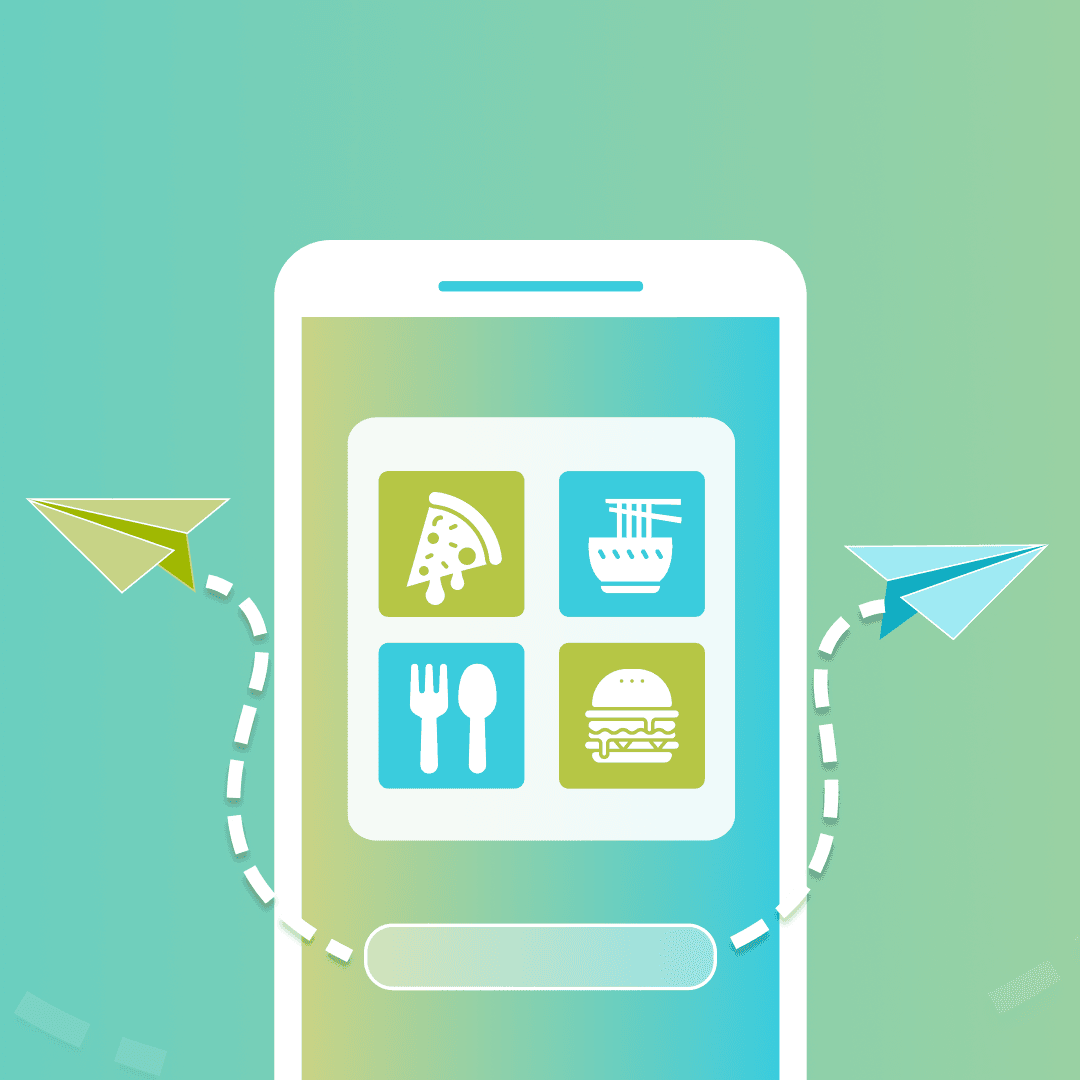

Mary Kearl
WriterIn the QSR and delivery sector, understanding and optimizing for customer engagement isn't simply important—it's critical for brands' survival and growth. QSR and delivery businesses that have adopted best-in-class digital and mobile marketing strategies have been able to not only survive the disruptive years of the pandemic, but thrive. As we advance into yet another year of change, uncertainty, and shifting customer preferences and behavior, let's reflect on what the state of customer engagement for QSR and delivery brands looks like today and what leaders in the space are doing to fuel innovation and outcomes.
For insights on the state of customer engagement for QSR and delivery brands and beyond, we conducted a global analysis based on:
- A market research study of 1,500 marketing executives at the VP level or higher from across 14 global markets, representing B2C companies with $10 million or more in annual revenue
- Data from over 5.4 billion global users from the Braze customer engagement platform, which powers experiences between consumers and 1,000+ brands across 50+ countries
- 1-1 interviews with top brands to get in-depth insights about their customer engagement efforts
The full findings of this research are available as part of our 2022 Global Customer Engagement Review (CER). Here are some of the top learnings specifically as it relates to the QSR and delivery industry.
How QSR and Delivery Brands Rank on the Braze Customer Engagement Index
For companies looking to understand how advanced their customer engagement practices are and how their industry or region compares to other sectors and parts of the world, getting that information can be a challenge. To help out, last year we introduced The Braze Customer Engagement Index to create a universal framework for assessing customer engagement maturity across a range of important factors.
This year, we used these parameters to evaluate the performance of QSR and delivery brands as a whole, with the goal of determining how many brands were at the Activate (lowest maturity), Accelerate, or Ace (highest maturity) levels. Here's what we found.
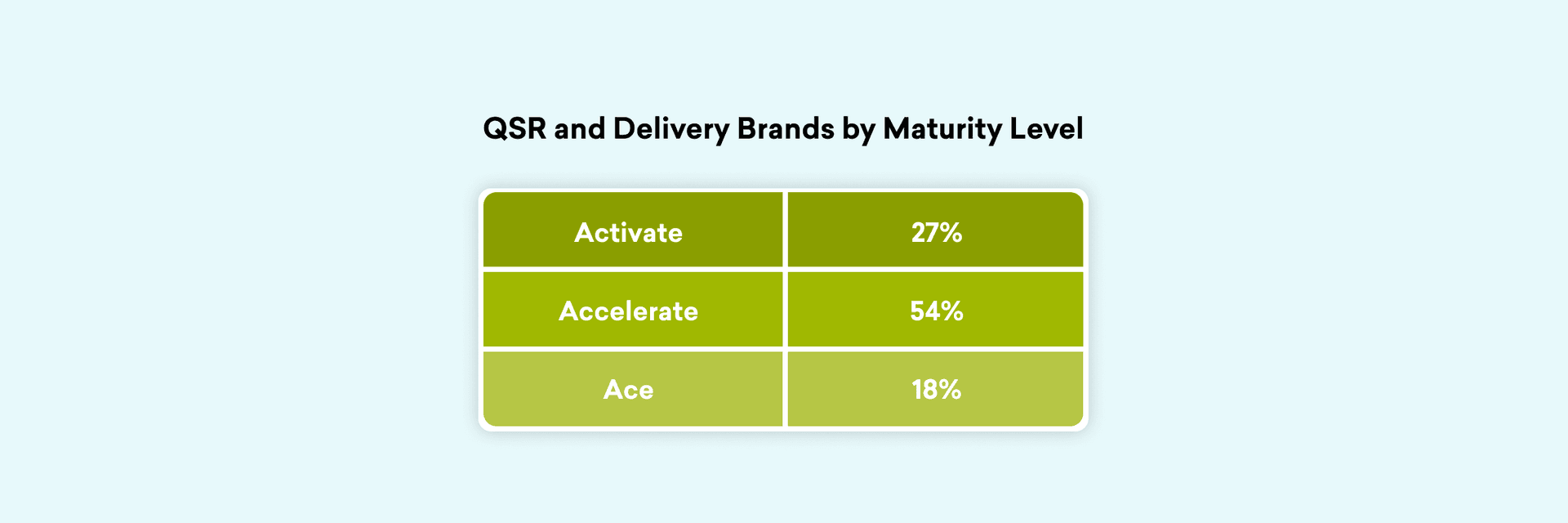
About the Levels
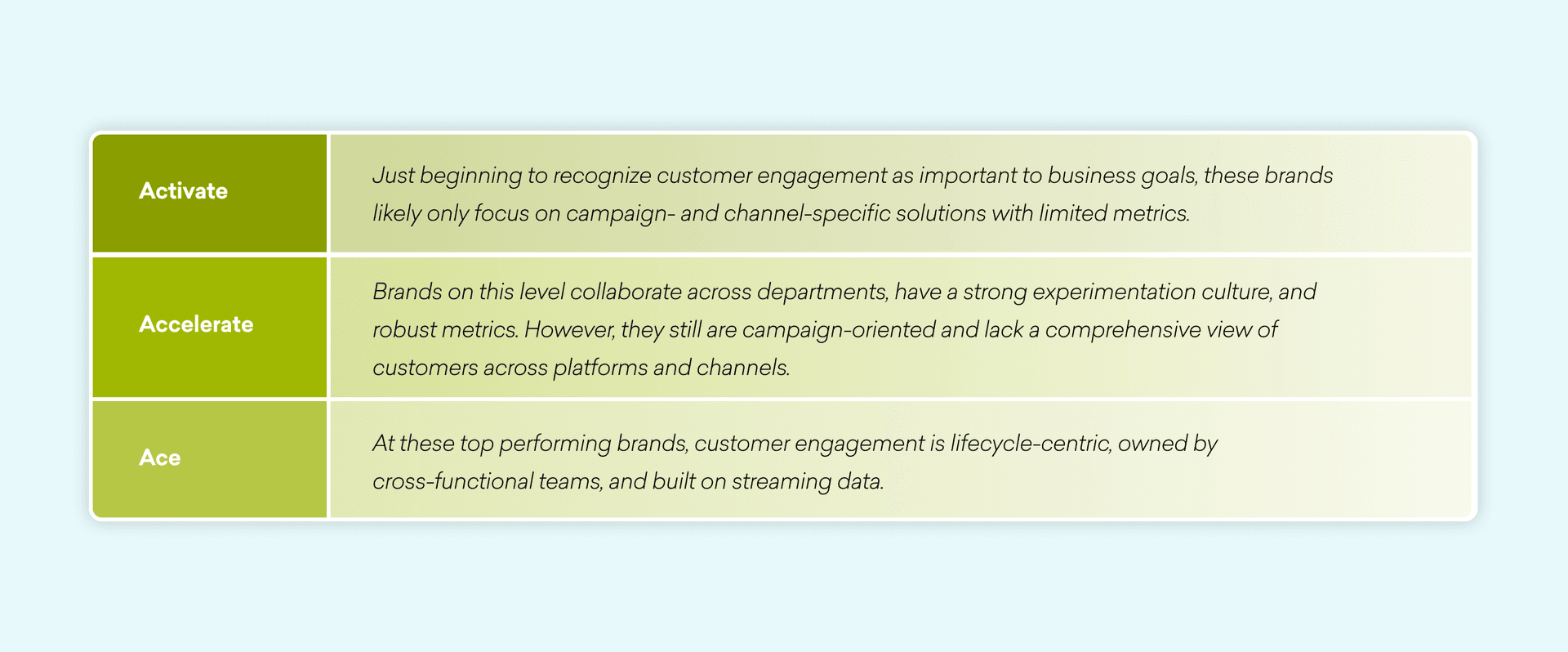
On the whole, QSR and delivery brands are more advanced when it comes to their customer engagement practices than the financial services, health and wellness, and media and entertainment sectors—all of which have a greater share of companies that are at the beginner Activate level.
The majority (54%) of QSR and delivery brands fall within the mid-level Accelerate range, with the remainder split between Activate (27%) and Ace (18%).
Key QSR and Delivery Customer Engagement Statistics
Here are some of the most noteworthy trends we uncovered about the state of customer engagement for QSR and delivery brands as part of the market research survey we commissioned of 1,500 marketing executives.
- 74% of QSR and delivery brands exceeded their revenue goals over the last year
- 85% of these companies offer mobile services
- 42% use a single customer engagement platform to engage users across multiple channels
The following are the top three areas where QSR and delivery bands plan to invest their marketing efforts:
- 53% say they plan to invest in machine learning/AI
- 51% say they plan to invest in chat support or chatbots
- 38% plan to invest in customer satisfaction measurement
What Sets QSR and Delivery Customer Engagement Leaders Apart
To see what sets Ace QSR and delivery brands apart from the rest when it comes to customer engagement, we took a look at their top differentiators. Here's what we found they have in common and how that's helping them yield customer engagement gains.
#1: Teamwork
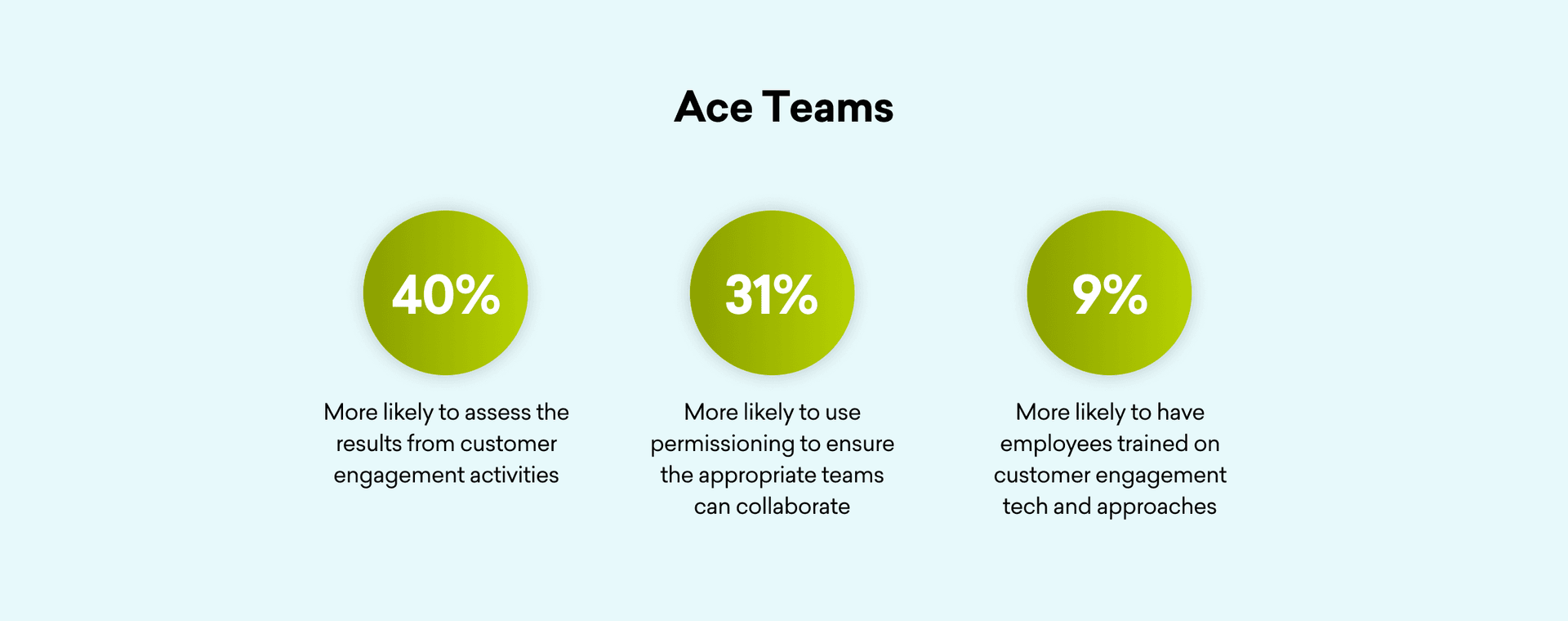
Compared with brands with beginner or intermediate customer engagement efforts, QSR and delivery customer engagement leaders are more likely to:
- Analyze their campaign performance
- Utilize campaign permissioning to enable effective team collaboration
- Train their customer engagement team members on the latest customer engagement technologies
This focus on campaign measurement and initiatives related to collaboration and training makes it possible for these brands to reduce operational silos and to continuously improve their customer engagement efforts over time based on the real-world results they see from their campaigns.
#2: Technology
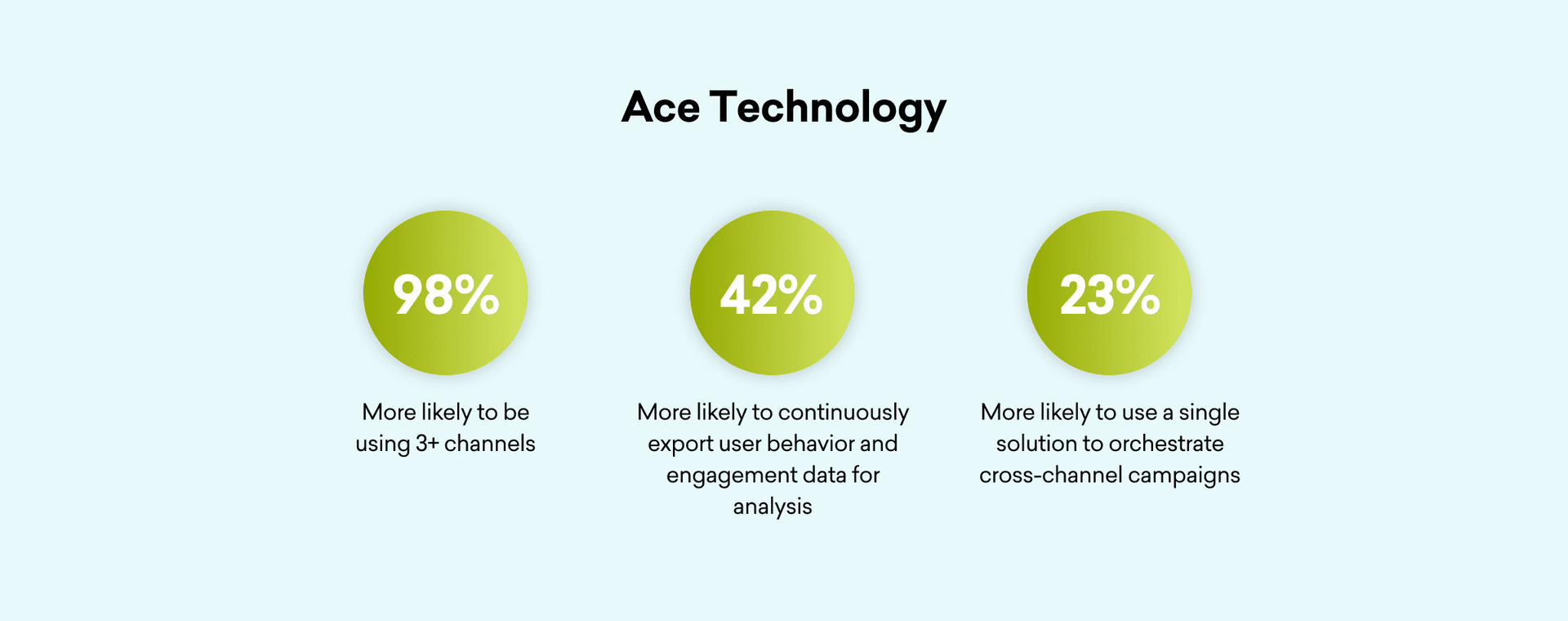
QSR and delivery customer engagement leaders are more likely to:
- Use three or more channels as part of a comprehensive cross-channel customer engagement strategy
- Use up-to-the-minute user behavior and engagement data for analysis
- Leverage a single customer engagement platform to orchestrate cross-channel campaigns
By centering cross-channel messaging campaigns in a single platform, these Ace brands are more easily able to provide customers with relevant experiences on the channels that they prefer, supporting strong marketing results over time.
#3: Results
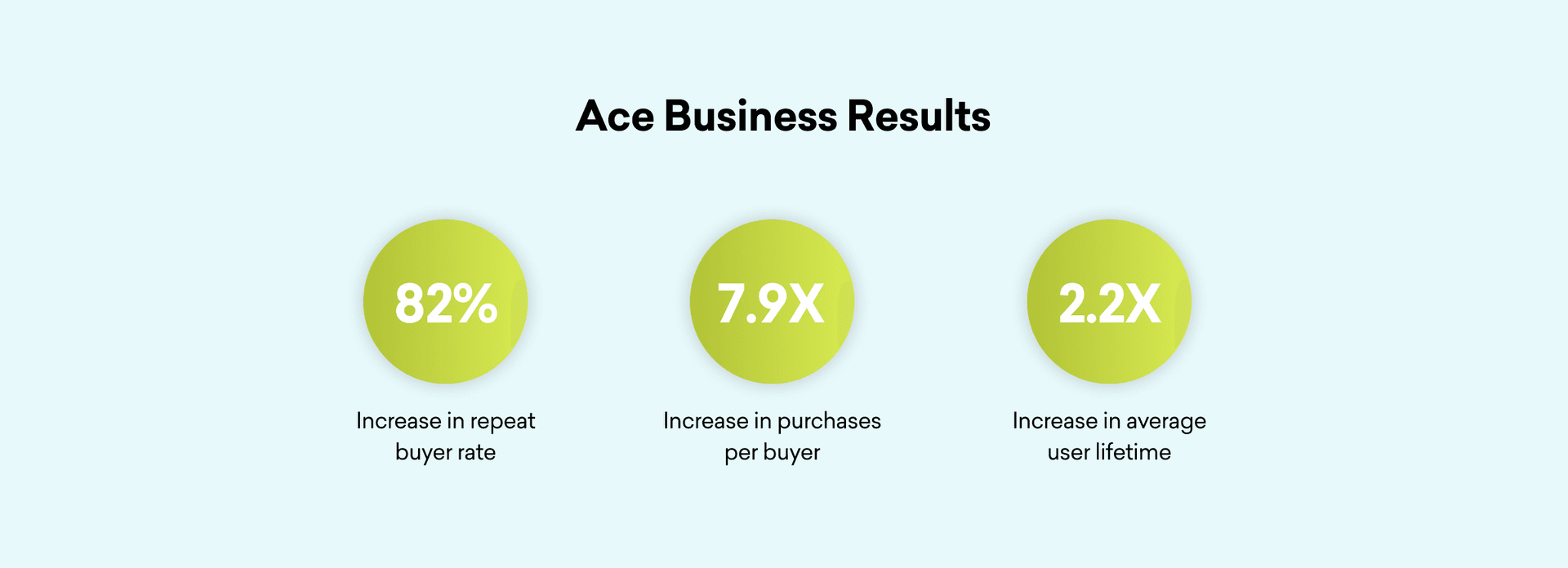
Ace brands that maximize both their talent and technologies deliver powerful results, like increasing in repeat buyers by 82%, boosting purchases per buyer by nearly 8X, and driving up average user lifetime by more than 2X.
Top Customer Engagement Opportunities for QSR and Delivery Brands
Here are two key areas where QSR and delivery brands can do more to elevate their customer engagement efforts.
#1: Connecting customer engagement efforts to the company's wider goals
Nearly all QSR and delivery brands (92%) say their customer relationship strategies are tied to engagement and downstream metrics like open rates and retention. While these KPIs are important, companies achieve greater success when they're able to tie results like activation and retention to broader company goals.
#2: Leveraging marketing automation tools to optimize customer engagement campaigns in the moment
Intelligence and automation technologies enable QSR and delivery brands to leverage AI to adjust their customer lifecycle engagement campaigns in the moment to maximize performance and free up marketers to tackle other priorities.
Take Your QSR or Delivery Brand's Customer Engagement to the Next Level
Looking for more insights on how to better activate, monetize, and retain your customers? Get a copy of the complete 2022 Global Customer Engagement Review for the latest insights on the state of customer engagement for QSR and delivery brands and beyond.
Plus, get access to exclusive case studies with important takeaways on how top brands like Mercari, Peacock, and more are upgrading their customer engagement strategies to build stronger relationships with customers and gain a competitive advantage.
Related Tags
Be Absolutely Engaging.™
Sign up for regular updates from Braze.
Related Content
View the Blog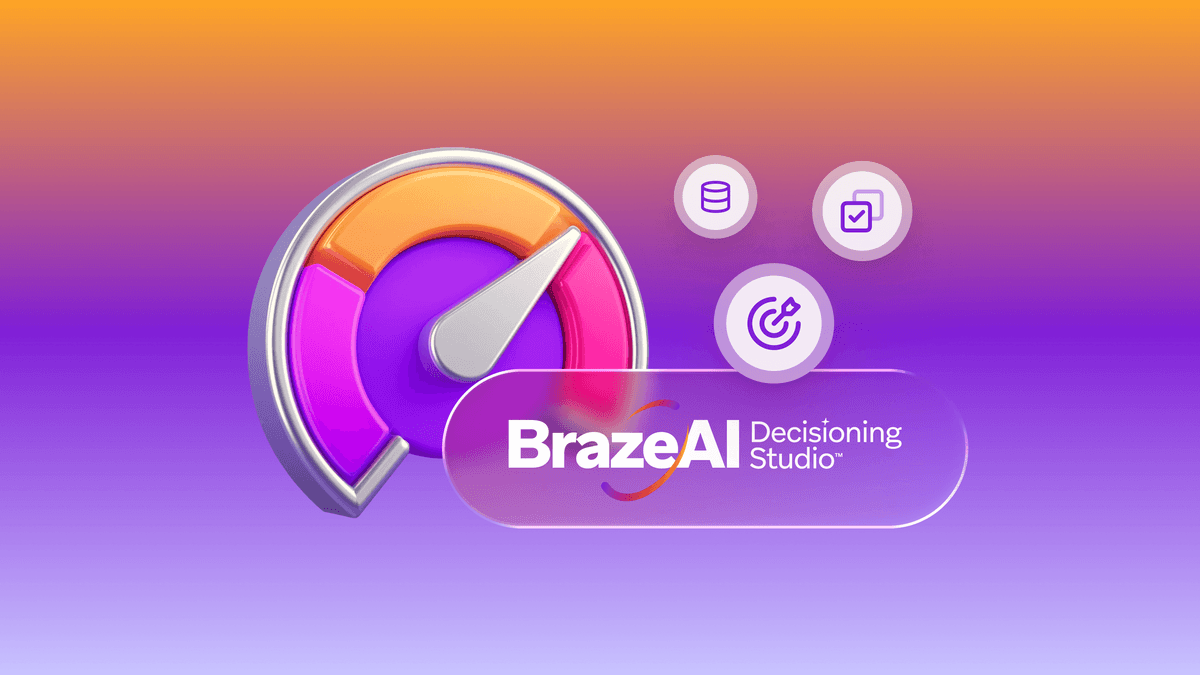
AI decisioning cheat sheet: How to crawl/walk/run with BrazeAI Decisioning Studioᵀᴹ

Team Braze

A day in the life of a data scientist on the BrazeAIᵀᴹ forward-deployed engineering team

McKay Jensen

The new inbox reality: How iOS changes are reshaping email marketing
